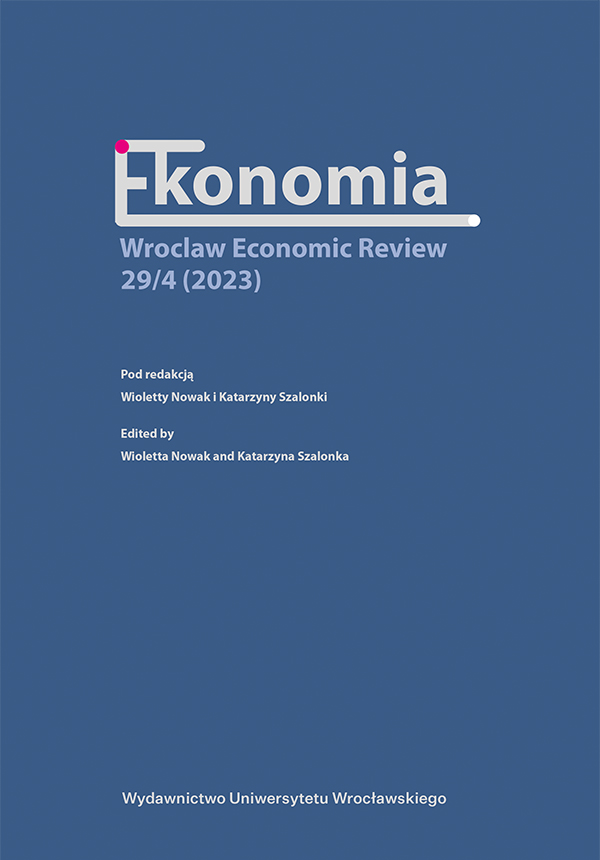

Artykuły

This paper examines the changes in consumption habits during the pandemic period as well as the impact of the crisis on young people’s consumption behavior. The study presents the considerations which are based on the authors’ own research, which involved the triangulation of qualitative and quantitative data. A quantitative study was conducted in 2021 on a representative sample of Poles (total number N = 1,268). This study aims to determine how much and to what extent the pandemic experiences have changed the consumer behavior habits of Poles.
It was hypothetically assumed that the post-pandemic experiences had a significant impact on changing the consumption habits of Poles.
In order to determine the durability of the changes in consumption that appeared in 2021, a qualitative research was carried out in 2023, in which a crisis in the consumption behavior of young people was conducted as an in-depth analysis. This research was conducted by the FGI (focus group interview) intelligence method among five focus groups. It assumed that young people are particularly sensitive to changes and they undertake compensatory consumption behavior during the crisis period.
Adamczyk, G. (2018). Młodzież w polskim społeczeństwie konsumpcyjnym. Między konsumpcją racjonalną, kompensacyjną a kompulsywną. Rocznik Lubuski, 44(1), 365–380.
Bejar-Agrela, M., Godspower-Diejomaoh, G., Maurel, L. (2012). What are the major changes the financial crisis impacted on the Spanish consumer behaviour? International Journal of Advance and Innovative Research, 8(3). Retrieved May 27, 2023, from https://iaraedu.com/pdf/ijair-volume-8-issue-3-v-july-september-2021.pdf.
Borsellino, V., Kaliji, S.A., Schimmenti, E. (2020). COVID-19 drives consumer behaviour and agrofood markets towards healthier and more sustainable patterns. Sustainability, 20(12), 1–26.
Bree, A. (2020, April 14). How Will COVID-19 Change Our Relationship with Food? Nutrition Connect. Retrieved May 27, 2023, from www.nutritionconnect.org/resource-center/how-will- covid-19-change-our-relationship-food.
Joyce, A., Hallett, J., Hannelly, T., Carey, G. (2014). The impact of nutritional choices on global warming and policy implications: Examining the link between dietary choices and greenhouse gas emissions. Energy and Emission Control Technologies, 2014(2), 33–43.
Lange, E. (2012). Konsumpcja kompensacyjna, zakupoholizm oraz zadłużenie dzieci i młodzieży. Roczniki Nauk Społecznych, 4(40), 115–130.
Long, N.N., Khoi, B.H. (2020). An empirical study about the intention to hoard food during COVID-19 pandemic. Eurasia Journal of Mathematics, Science and Technology Education, 16(7), 1–12.
Ministry of Finance. (2022, May 16). Spring Forecast 2022 — prognozy Komisji Europejskiej. Retrieved May 15, 2023, from www.gov.pl/web/finanse/spring-forecast-2022--prognozy-komisji-europejskiej.
Müller, A., Mitchell J., de Zwaan M. (2015). Compulsive buying. The American Journal on Addiction, 24(2), 132–137.
O’Guinn, T., Faber, R. (1989). Compulsive buying: A phenomenological exploration. Journal of Consumer Research, 16(2), 147–157.
Patrzałek, W. (2022). Konwestycja jako forma dekonsumpcji. Wrocław: Wydawnictwo Uniwersytetu Ekonomicznego we Wrocławiu.
Reisch, A., Neuner M., Raab G. (2004). Zur Entstehung und Verbreitung der “Kaufsucht” in Deutschland. Aus Politik und Zeitgeschichte, B1–2, 15–22.
Rumpf, H.-J. (2012). Die Grenzen des Suchtbegriffs. Sucht, 58(2), 81–83.
Szczepański, J. (1981). Konsumpcja a rozwój człowieka: wstęp do antropologicznej teorii konsumpcji. Warszawa: Państwowe Wydawnictwo Ekonomiczne.
Theodoridou, G., Tsakiridou, E., Kalogeras, N., Mattas, K. (2019). The impact of the economic crisis on Greek consumer behavior towards food consumption. International Journal on Food System Dynamics, 10(3), 298–314.
Wardzała, J. (2019). Młodzi w społeczeństwie konsumpcyjnym: wiedza, opinie i oczekiwania młodego pokolenia wobec konsumpcji i jego zachowania konsumenckie. Wrocław: Wydawnictwo Uniwersytetu Wrocławskiego.